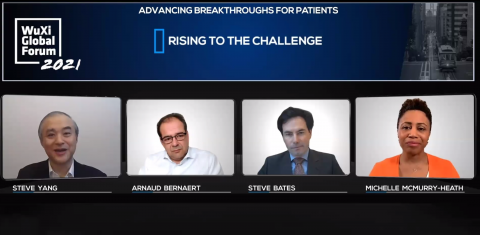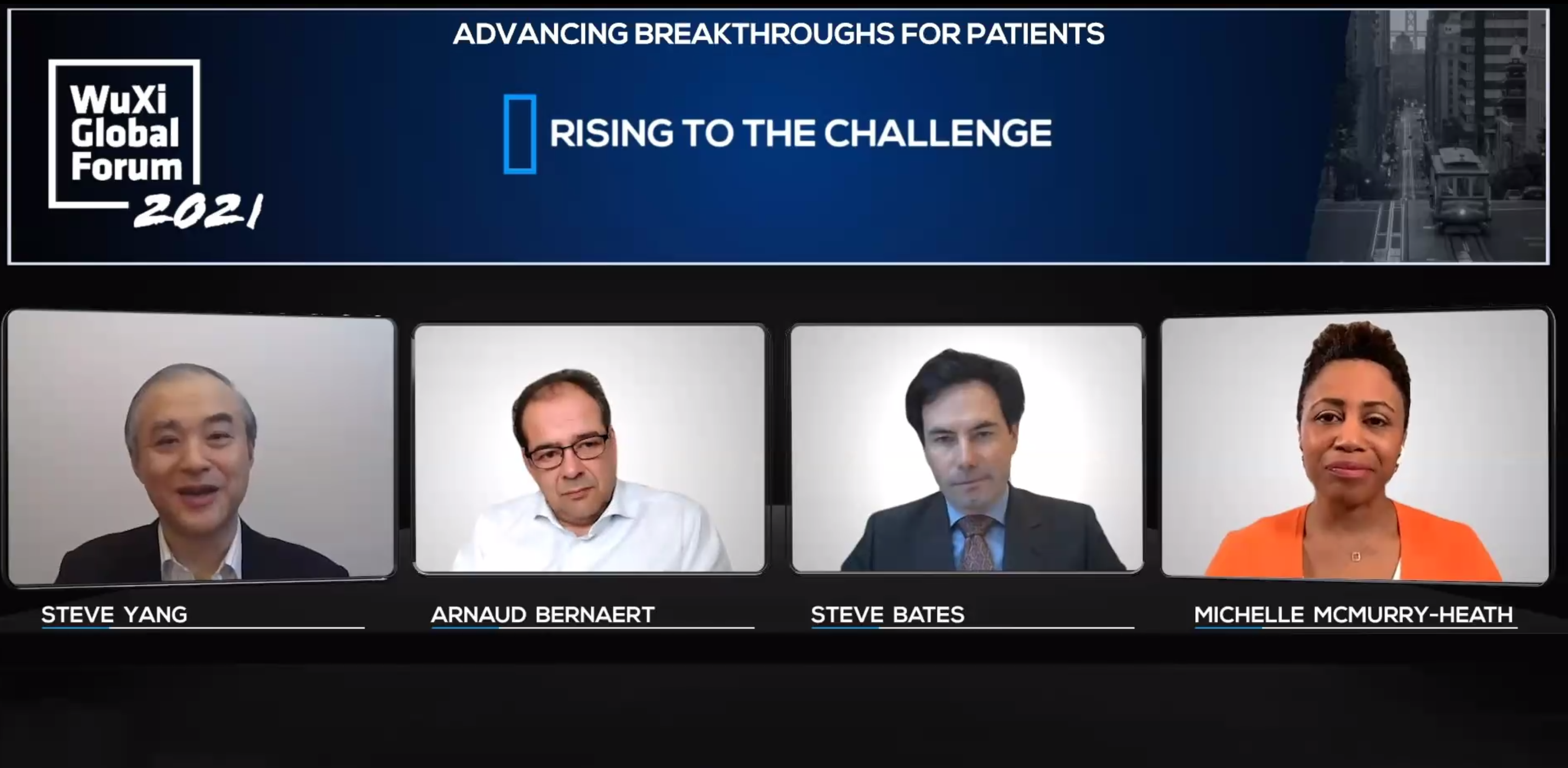If there’s a silver lining to the past year, it’s that we’ve learned a lot about how to accelerate innovation and get breakthroughs to patients, even in the most trying times.
On January 11, 2021, BIO President and CEO Dr. Michelle McMurry-Heath joined global experts during the WuXi Global Forum 2021—a key event during JPM Week—to discuss how the biotechnology industry rose to the challenge.
Steve Yang, Co-CEO of WuXi AppTec, said that while it was an extremely challenging year, “everyone in the industry joined together to rise to the historic occasion” and deliver solutions with “unprecedented speed and effectiveness.”
To discuss how they did it, BIO’s Dr. Michelle McMurry-Heath joined Steve Bates, CEO of the BioIndustry Association (BIO’s sister association in the UK), and Arnaud Bernaert, Global Head of the Platform for Shaping the Future of Health and Healthcare at the World Economic Forum.
What challenges and opportunities did the pandemic pose for the industry?
“Almost every challenge imaginable,” said Dr. McMurry-Heath.
However, it was “remarkable to see how the industry rose to the challenge” with unprecedented collaboration and speed to deliver new solutions to patients. In fact, in one year, the industry launched 838 programs targeting COVID-19. (You can see the progress in BIO’s COVID-19 Therapeutic Development Tracker.)
The BioIndustry Association’s Steve Bates named two challenges: society’s need for an answer, and capacity constraints to do what’s needed at the global scale and pace required.
But by stepping up to these challenges, the biotech industry had two opportunities, too: to showcase innovation and entrepreneurship, and to showcase the community as a science-based, collaborative industry that’s concerned about ensuring global access to new technology.
How did collaboration play a role?
“Our industry has always been about collaboration,” said Dr. McMurry-Heath. In 2020, however, we saw intense collaboration between federal partners, NGOs, and academic institutions, too, in a way we’ve never seen before. Meanwhile, companies put aside “competitive instincts” and formed new kinds of partnerships.
Example: BIO launched the Coronavirus Hub, a “Craigslist-type approach” to helping companies get what they need and work together in ways that previously would have taken months if not years.
Bates noted the importance of both global data sharing and intellectual property.
“We have to pay tribute to the distribution of the genetic code of COVID-19 to enable early innovation,” he said, as well as sharing of global data on the use of steroids in seriously ill patients, which changed the paradigm on treating them.
However, without IP protections, it would have been “very difficult to do this at the pace and scale that we’ve seen.”
The future of innovation
“We now know what science can deliver when we have a concerted and focused effort to get there,” said Dr. McMurry-Heath. “Where there’s a will, there’s a way.”
“Science is not the stumbling block—it’s collaboration, short market access, contact with regulators and regulatory flexibility that doesn’t compromise on safety or efficacy but is rapid in its response and adaptation, collaboration on clinical trial networks,” she said. Luckily, “these are problems we can fix.”
“Now, we need to have a completely different set of expectations as we go forward and try to solve other disease areas,” she continued.
5 lessons learned
- “What matters is the number of shots on goal,” said Dr. McMurry-Heath.
- We need an “inclusive approach to research and development,” with diverse players around the table and in clinical trials so when we take new science to diverse communities, “you have the data to back it up.”
- Look for synergies in manufacturing, said the World Economic Forum’s Bernaert.
- Build and keep the confidence with the public, said Bates, from clinical trials “all the way through the vaccination process.”
- “Clinical trial and regulatory infrastructure globally need to be upgraded in a massive way, so we have the capacity” for the science that’s about to come, added Dr. McMurry-Heath.
It’s not too late to participate in the WuXi Global Forum. Day 2 (today!) will highlight challenges and opportunities ahead, and Day 3 (January 13) will focus on what health care will look like in 2040. Additional speakers include executives from BIO members Alnylam Pharmaceuticals, Genentech, Johnson & Johnson, Pfizer, Sana Biotechnology, and Verve Therapeutics. Click here to register.

















.png)


